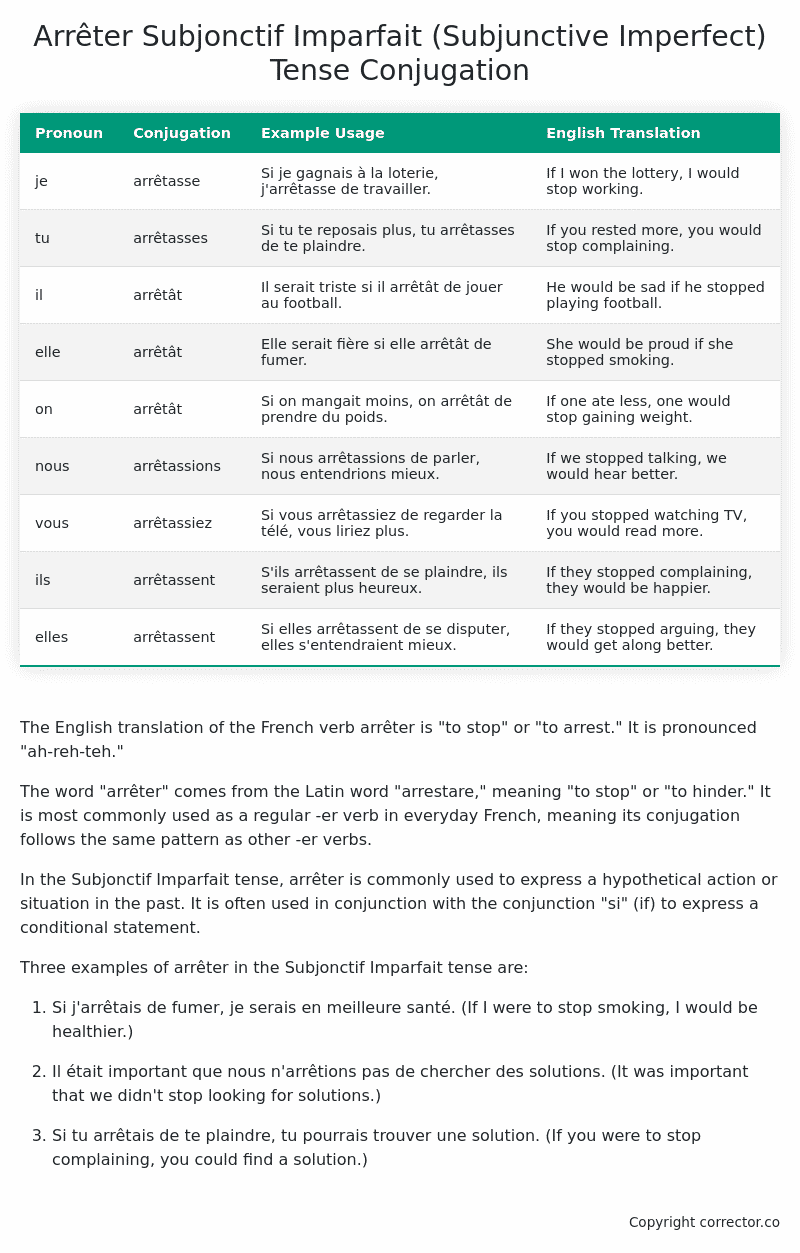Subjonctif Imparfait (Subjunctive Imperfect) Tense Conjugation of the French Verb arrêter
Introduction to the verb arrêter
The English translation of the French verb arrêter is “to stop” or “to arrest.” It is pronounced “ah-reh-teh.”
The word “arrêter” comes from the Latin word “arrestare,” meaning “to stop” or “to hinder.” It is most commonly used as a regular -er verb in everyday French, meaning its conjugation follows the same pattern as other -er verbs.
In the Subjonctif Imparfait tense, arrêter is commonly used to express a hypothetical action or situation in the past. It is often used in conjunction with the conjunction “si” (if) to express a conditional statement.
Three examples of arrêter in the Subjonctif Imparfait tense are:
-
Si j’arrêtais de fumer, je serais en meilleure santé. (If I were to stop smoking, I would be healthier.)
-
Il était important que nous n’arrêtions pas de chercher des solutions. (It was important that we didn’t stop looking for solutions.)
-
Si tu arrêtais de te plaindre, tu pourrais trouver une solution. (If you were to stop complaining, you could find a solution.)
Table of the Subjonctif Imparfait (Subjunctive Imperfect) Tense Conjugation of arrêter
| Pronoun | Conjugation | Example Usage | English Translation |
|---|---|---|---|
| je | arrêtasse | Si je gagnais à la loterie, j’arrêtasse de travailler. | If I won the lottery, I would stop working. |
| tu | arrêtasses | Si tu te reposais plus, tu arrêtasses de te plaindre. | If you rested more, you would stop complaining. |
| il | arrêtât | Il serait triste si il arrêtât de jouer au football. | He would be sad if he stopped playing football. |
| elle | arrêtât | Elle serait fière si elle arrêtât de fumer. | She would be proud if she stopped smoking. |
| on | arrêtât | Si on mangait moins, on arrêtât de prendre du poids. | If one ate less, one would stop gaining weight. |
| nous | arrêtassions | Si nous arrêtassions de parler, nous entendrions mieux. | If we stopped talking, we would hear better. |
| vous | arrêtassiez | Si vous arrêtassiez de regarder la télé, vous liriez plus. | If you stopped watching TV, you would read more. |
| ils | arrêtassent | S’ils arrêtassent de se plaindre, ils seraient plus heureux. | If they stopped complaining, they would be happier. |
| elles | arrêtassent | Si elles arrêtassent de se disputer, elles s’entendraient mieux. | If they stopped arguing, they would get along better. |
Other Conjugations for Arrêter.
Le Present (Present Tense) Conjugation of the French Verb arrêter
Imparfait (Imperfect) Tense Conjugation of the French Verb arrêter
Passé Simple (Simple Past) Tense Conjugation of the French Verb arrêter
Passé Composé (Present Perfect) Tense Conjugation of the French Verb arrêter
Futur Simple (Simple Future) Tense Conjugation of the French Verb arrêter
Futur Proche (Near Future) Tense Conjugation of the French Verb arrêter
Plus-que-parfait (Pluperfect) Tense Conjugation of the French Verb arrêter
Passé Antérieur (Past Anterior) Tense Conjugation of the French Verb arrêter
Futur Antérieur (Future Anterior) Tense Conjugation of the French Verb arrêter
Subjonctif Présent (Subjunctive Present) Tense Conjugation of the French Verb arrêter
Subjonctif Passé (Subjunctive Past) Tense Conjugation of the French Verb arrêter
Subjonctif Imparfait (Subjunctive Imperfect) Tense Conjugation of the French Verb arrêter (this article)
Subjonctif Plus-que-parfait (Subjunctive Pluperfect) Tense Conjugation of the French Verb arrêter
Conditionnel Présent (Conditional Present) Tense Conjugation of the French Verb arrêter
Conditionnel Passé (Conditional Past) Tense Conjugation of the French Verb arrêter
L’impératif Présent (Imperative Present) Tense Conjugation of the French Verb arrêter
L’infinitif Présent (Infinitive Present) Tense Conjugation of the French Verb arrêter
Struggling with French verbs or the language in general? Why not use our free French Grammar Checker – no registration required!
Get a FREE Download Study Sheet of this Conjugation 🔥
Simply right click the image below, click “save image” and get your free reference for the arrêter Subjonctif Imparfait tense conjugation!

Arrêter – About the French Subjonctif Imparfait (Subjunctive Imperfect) Tense
Formation
Common Everyday Usage Patterns
Interactions with Other Tenses
Subjonctif Présent
Indicatif Passé Composé
Conditional
Conditional Perfect
Summary
I hope you enjoyed this article on the verb arrêter. Still in a learning mood? Check out another TOTALLY random French verb conjugation!


